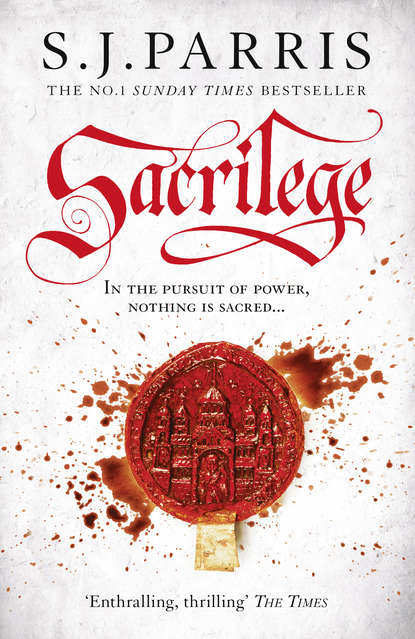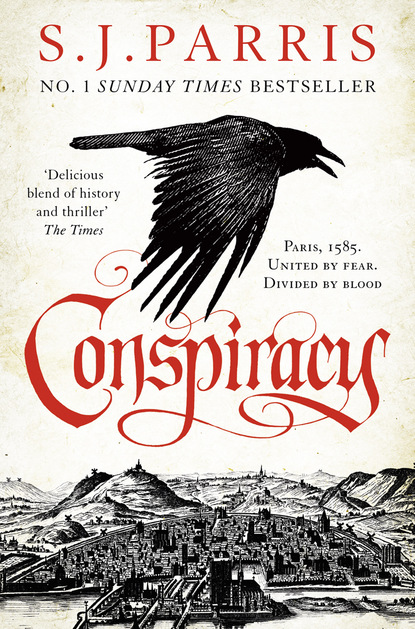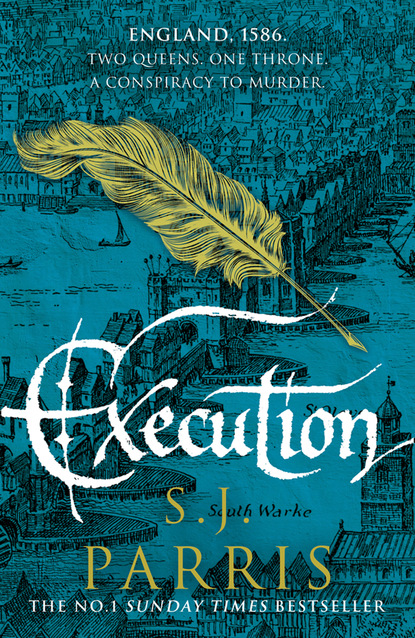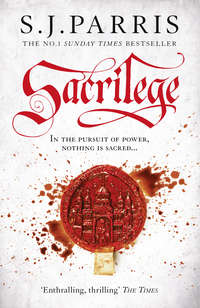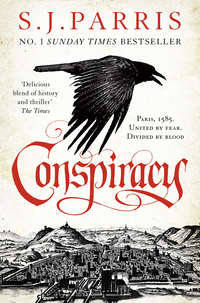
Полная версия
‘I swear to you, Bruno, by the time we come home, the sight of the riches we bring to her treasury will make her forget on the instant.’ When I do not reply, he leans in, dropping his voice to a whisper. ‘You do realise the money Walsingham pays you is not charity? He pays you for information. And if the Baron de Châteauneuf has as good as banished you, how can you continue to provide it?’
‘I will find a way. I always have before. Walsingham knows I will not let him down.’
‘Come, Bruno!’ He gives me a little shake, to jolly me along. ‘Do you not yearn to see the New World? What good is it to dream of worlds beyond the fixed stars if you dare not travel our own globe?’ He pushes a hand through his hair so that the front sticks up in tufts, a gesture he makes without knowing whenever he is agitated. ‘You’re thirty-seven years old. If you want nothing more from life than to sit in a room with a book, I can’t think why you ever left the cloister.’
‘Because I would have been sentenced to death by the Inquisition,’ I say, quietly. As he well knows. But how do you explain to a man like Sidney the reality of a life in exile? ‘And what of your wife and child?’ I add, as he stretches again and turns as if to leave.
He looks at me as if he does not understand the question. ‘What of them?’
‘Your first child is due in, what, three months? And you mean to be halfway across an ocean.’ With no good odds on returning, I do not say aloud. Even I know that Francis Drake’s famous circumnavigation returned to England with only one ship of six and a third of the men. But Sidney is as irrepressible as a boy when he sets his heart on something; he clearly believes there is no question but that we will return triumphant with armfuls of Spanish gold.
He frowns. ‘But I have done my part. She will have the child whether I am there or not, and there will be nursemaids to take care of it. God’s blood, Bruno, I have done what they asked of me, I have got an heir, that is why they have had me cooped up at Barn Elms for the past two years. Am I not permitted a little freedom now?’
I am tempted to observe that he has possibly misunderstood the nature of marriage, but I refrain; I am hardly qualified to advise him about women. Besides, there is no profit in making him more irritable. His anger, I see now, is not at me, but at everyone who would voice the same objections: his wife, his father-in-law, Francis Drake, the Queen. He is rehearsing his self-justification. I have great affection for Sidney, and he has many qualities I admire, but he can be spoilt and does not respond well to being thwarted.
‘It might be a girl,’ I reply.
He makes a noise of exasperation. ‘I am going back down for a drink. Are you coming?’
‘I think I will stay here for a while.’
‘As you wish.’ At the head of the stairs to the main deck he turns back, one hand on the guardrail. ‘You know, I am trying to find a way to help you, Bruno. I thought I might have a little more thanks than this.’ He sounds wounded. In my amazement at his mad scheme, it had not occurred to me that I might have hurt his feelings.
‘Forgive me. I am grateful for your efforts – do not think otherwise.’
‘You are coming, then? To the New World?’ His face brightens.
‘Let me get used to the idea.’
He disappears to the lower deck and I return my attention to the restless black water that surrounds us. Two weeks of this had seemed a diversion; months on end is another proposition entirely. In sunlight, the sea looked benign, obliging; now its vastness strikes me as overwhelming. To challenge it, to attempt to best it with such a small vessel, appears grotesquely presumptuous. But perhaps all acts of courage look like folly at first. The breeze lifts my hair from my face, and I realise that the sun has fully set and the horizon is no longer visible on either side. There is no divide between sea and sky, nothing but endless darkness and the indifferent stars.
TWO
We round the headland into Plymouth Sound two days later, early evening on 23rd August, as a cheer goes up from the men on deck. The wind has not been on our side since we passed the coast of Kent and moved into the English sea, making our progress slower than Knollys had predicted, but now the sky is clearer overhead, the sun glistening on a broad bay, surrounded on three sides by gently sloping cliffs, dark green with thick tree cover. Sidney and I have been standing at the prow for the past hour, craning for the first sight of the harbour, but nothing could have prepared me for the spectacle of the fleet anchored in the Sound.
Some thirty ships of varying sizes, the largest painted black and white and greater even than the Galleon Leicester, stand at anchor; between the great painted fighting ships and merchantmen, ten or so smaller pinnaces rock gently on the swell, sails furled, pennants snapping, their heraldic colours bright against the pale sky. The water sparkles and the whole has the appearance of a marvellous pageant. I find myself staring open-mouthed with delight like a child, Sidney likewise, as the crewmen on deck send up another cheer at the sight of their comrades. Until this moment, I would not have claimed any great interest in seafaring, but the assembled fleet is truly a sight to stir a sense of adventure. I picture all these ships sailing out in formation at Drake’s command, pointed towards the New World, Sidney and me at the prow, squinting into the sun towards an unknown horizon. And returning, to the salute of cannon from the Plymouth shore, our pockets bursting with Spanish gold. Sidney really believes this is possible; now that we are here, it is hard not to be infected by his conviction. All about us, a volley of shouted commands is unleashed, followed by the heavy slap of canvas as sails are furled, ropes heaved, chains let out with a great clanking of metal on metal, and the vast creaking bulk of the Galleon Leicester slows almost to a standstill as her anchors are dropped and rowboats lowered down her sides to the water. Knollys turns to us, eyes bright with pride, as if this show is all his doing.
‘There, gentlemen, you see the flagship, the Elizabeth Bonaventure, Sir Francis Drake’s own command. And there, the Tiger, captained by Master Carleill.’
He points across the Sound; Sidney shoots me a sideways look and a grimace. Half the investors in this expedition he knows from court, many of the officers men with connections to his own family. He will have to keep his plans quiet until the voyage is underway, for fear of Walsingham finding out.
Knollys continues, oblivious, his outstretched arm casting a long shadow over the deck as he gestures: ‘Across the way you have the Sea Dragon, the White Lion and the Galliot Duck, and there the little Speedwell, and beside her the Thomas Drake, named for the Captain-General’s brother and under his command.’
We are near enough to see the crews of the other ships, men scuttling up and down rigging and swarming over the decks like insects. Now that we are at ease in the shelter of the harbour, the breeze has dropped and I feel the warmth of the sun on my back for the first time since we left London.
‘And what is that island?’ I ask, pointing to a mound of rock in the middle of the Sound. Sheer cliffs rise to a wooded crest, and at the summit, a stone tower peeps above the treeline.
‘St Nicholas Island,’ Knollys says, shading his eyes, ‘though the locals call it Drake’s Island. Sir Francis has been trying to raise money to improve the fortifications in case of invasion. There was a garrison there in years past, though I believe it has fallen out of use for lack of funds. But come – the Captain-General, as we must call him on this voyage, will be expecting us.’
He leads us down a flight of stairs below deck, where he calls for rope ladders to be dropped over the side through a hatch. These are thin, precarious-looking contraptions, but Knollys swings himself easily into the gap and shins down to the two stout sailors holding the end of the ladder steady in the rowboat below. Sidney nudges me to follow, and a silent sailor hands me through the hatch, where I climb without looking down, gripping the ropes until my palms burn, placing one foot below the other, conscious all the while of Sidney’s impatient feet inches above my head.
The oarsmen negotiate a path between the anchored ships and from this vantage point, at the waterline, you understand the immensity of these galleons; their hulls the height of a church, their masts disappearing to a point so high you have to crane your neck until you are almost lying horizontal to see the top. Navigating through them you feel as if you are in a narrow lane between high buildings, if buildings were uprooted from their foundations and could lurch and heave at you. A hearty melody of flutes and viols carries across the water, accompanied by raucous singing that collapses into laughter after one verse. A few more strokes of the oars and our boat cracks against a sheer wooden cliff scaled with barnacles, where another ladder sways, awaiting us. I glance at my palms. Sidney notices and laughs.
‘Don’t expect to go home with the soft hands of a gentleman, Bruno.’
‘I’m not sure I have ever had the soft hands of a gentleman,’ I say. I hold them out and regard them on both sides, as if for evidence. My fingertips are stained with ink, as always.
‘That’s not what the ladies of the French court say,’ he replies, with a broad wink. It is one of Sidney’s favourite jokes: that I worked my way through the duchesses and courtesans of Paris before turning my keen eye to England. It amuses him that I was once a monk; he cannot imagine how I managed to keep to it all those years, the most vigorous years of my youth. He can only picture how he himself would have been, and so he likes to joke that, since leaving holy orders, I go about rutting everything in sight like a puppy on a chair leg. It amuses him all the more for being untrue.
Knollys precedes us up the ladder; Sidney follows and I am left to bring up the rear. This ship is higher even than the Leicester; my arms begin to ache and the ladder shows no sign of ending. I dare not look anywhere except directly in front of me, at the snaking ropes and the wooden wall that grazes my knuckles each time the swell knocks me against it. As my head draws level with the rail, I reach out to grasp it and my hand slips; for a dizzying moment I fear I may lose my footing, but a strong hand grips my wrist and hauls me inelegantly over the side.
‘Steady there.’
I regain my balance, take a breath, and look up to face my rescuer.
‘And who is this, that we nearly lost to the fishes?’ he asks, not unkindly. As he smiles down a gold tooth flashes in the corner of his mouth.
‘Doctor Giordano Bruno of Nola, at your service.’ My heart is pounding with relief, or shock, or both, at the thought that I might have fallen the full height of the ship. ‘Sir,’ I add, realising whom I am addressing.
No introduction is needed on his part; the quiet authority of the man, his natural self-assurance, the way the others stand in a deferential half-circle around him, leave me in no doubt that I am speaking to the one the Spanish call El Draco, the dragon. England’s most famous pirate smiles, and claps me on the shoulder.
‘You are welcome, then, to the Elizabeth Bonaventure. Are you a doctor of physick?’ His expression is hopeful.
‘Theology, I’m afraid. Less useful.’ I offer an apologetic smile.
‘Oh, I don’t know.’ He looks at me, appraising. ‘We may yet find a use for you. Come, gentlemen – are you hungry? We will take supper in my quarters.’
Knollys bows his head. ‘Thank you. There is much to discuss.’
‘Ah, Captain Knollys.’ Francis Drake rubs his beard and his smile disappears. ‘More than you know.’
There is a heaviness in his voice, just for an instant, that catches my attention, but he turns away and calls orders to one of the men standing nearby. It is an opportunity to study the Captain-General unobserved. He is broad-shouldered and robust, taller than me though not as tall as Sidney, with an open face, his skin tanned and weathered by his years at sea. There are white creases at the corners of his eyes, as if he laughs so often that the sun has not been able to reach them. His brown hair is receding and flecked with grey at his temples and most visibly in his neat beard; I guess him to be in his mid-forties. I see now why Sidney, despite his bluster about rank, is so keen to impress this man; Drake radiates an air of quiet strength earned through experience, and in this he reminds me a little of my own father, a professional soldier, though Drake cannot be more than ten years my senior. I find I want him to like me.
Drake turns back to us and claps his hands together. ‘Come, then. You should at least quench your thirst while we wait for the food.’
As we follow him to the other end of the deck, the crew pause in their duties and watch us pass. I notice there is an odd atmosphere aboard this ship; a sullen suspicion in the way they watch us from the tail of their eye, and something more, a muted disquiet. There is no music or singing here. The men are almost silent; I hear none of the foul-mouthed, good-natured banter I have grown used to among the crew of the Leicester on our way down. Do they resent our presence? Or perhaps they are silent out of respect. I catch the eye of one man who stares back from beneath brows so thick they meet in the middle; his expression is guarded, but hostile. Something is wrong here.
Drake leads us to a door below the quarterdeck, where two thick-set men stand guard with halberds at their sides, staring straight ahead, grim-faced. Light catches the naked edges of their blades. I find their presence unsettling. I guess that Drake and the other officers keep items of value in their quarters and must have them defended, though such a display of force seems to show a marked lack of faith in his crew. He leans in to exchange a few words with one of the guards in a low murmur, then opens the door and leads us through into a handsomely appointed cabin, proportioned like Knollys’s room aboard the Leicester, but more austerely furnished. Trimmings are limited to one woven carpet on the floor and the dark-red drapes gathered at the edges of the wide window that reaches around three sides of the cabin. Under it stands a large oak table, spread with a vast map, surrounded by nautical charts and papers with scribbled calculations and sketches of coastline. Behind the table, bent over these charts with a quill in hand, is a skinny young man with a thatch of straw-coloured hair and small round eye-glasses perched on his nose. He jolts his head up as we enter, stares at us briefly, his Adam’s apple bobbing in his throat, then begins sweeping up the papers with as much haste as if we had caught him looking at erotic prints.
‘Thank you, Gilbert – get those cleared away and leave us, would you?’ Drake says.
The young man nods, and takes off his eye-glasses. Without them, he is obliged to squint at us. He rolls up the charts with a practised movement and gathers the papers together, stealing curious glances at me and Sidney as he does so.
‘That is the Mercator projection, is it not?’ I say, leaning forward and pointing to the large map as he begins to furl it. He peers at me and darts a quick glance at Drake, as if to check whether he is permitted to answer.
‘You know something of cartography, Doctor Bruno?’ Drake says, looking at me with new interest.
‘Only a little,’ I say hastily, as the world disappears into a blank cylinder under the young man’s ink-stained fingers. ‘But anyone with an interest in cosmography is familiar with Mercator’s map. The first true attempt to spread on a plane the surface of a sphere, measuring latitude with some mathematical accuracy.’
‘Exactly,’ the young man says, his face suddenly animated. ‘It is the first projection of the globe designed specifically for navigation at sea. Mercator’s great achievement is to alter the lines of latitude to account for the curvature of the Earth. It means we can now plot a ship’s course on a constant bearing—’ He catches sight of Drake’s face and swallows the rest of his explanation. ‘Forgive me, I am running on.’
‘My clerk, Gilbert Crosse.’ Drake gestures to the young man with an indulgent smile as he eases out from behind the table. ‘Gilbert, these are our visitors newly arrived on the Leicester – Captain Knollys, Sir Philip Sidney and Doctor Giordano Bruno.’ The clerk smiles nervously and nods to each of us in turn, though his red-rimmed eyes linger on me as he locks the papers away in a cupboard and backs out of the room.
‘Very gifted young man there,’ Drake says, nodding towards the door after Gilbert has closed it behind him. ‘Came to me via Walsingham, you know. Take a seat, gentlemen.’
Behind the table, wooden benches are set into the wall panelling. We squeeze in as Drake pours wine into delicate Venetian glasses from a crystal decanter. The young clerk has left a brass cross-staff on the table, an instrument used to determine latitude; my friend John Dee, the Queen’s former astrologer, kept one in his library. I pick it up and, as no one seems to object, I hold one end against my cheek and level the other at the opposite wall, imagining I am aligning it with the horizon.
‘Careful, Bruno, you’ll have someone’s eye out,’ Sidney says, sprawling on the bench, his arm stretched out along the back behind me.
I lower the cross-staff to see Drake observing me with interest. ‘Can you use it?’
‘I have been shown how to calculate the angle between the horizon and the north star, but only on land.’ I set it back on the table. ‘I don’t suppose that counts.’
‘It’s more than many. An unusual skill for a theologian. Can you use a cross-staff, Sir Philip?’ he says, turning to Sidney, mischief in his eye.
Sidney waves a hand. ‘I’m afraid not, Drake, but I am willing to learn.’
Drake passes him a glass of wine with a polite smile. He cannot fail to notice that Sidney does not give him his proper title; both are knighted and therefore equal in status, though you will not persuade Sidney of that. I watch Drake as he sets my glass down. The tension I sensed among the men on deck has seeped in here, even into the refined and polished space of the captain’s cabin. I think of the armed men outside the door.
The latch clicks softly and Drake half-rises, quick as blinking, his right hand twitching to the hilt of his sword, but he relaxes when he sees the newcomers, a half-dozen men with wind-tanned faces, dressed in the expensive fabrics of gentlemen. Leading them is a man of around my own age, thinner but so like Drake in all other respects that he can only be a relative. He crosses to the table and embraces him.
‘Thomas! Come, join us, all of you.’ Drake points to the bench beside Sidney. There is relief in his laughter and I observe him with curiosity; what has happened to put this great captain so on edge? ‘You know Sir Philip Sidney, of course, and this is his friend, Doctor Bruno, come to greet Dom Antonio, whom we expect any day. Gentlemen, I present my brother and right-hand man, Thomas Drake. And this is Master Christopher Carleill, lieutenant-general of all my forces for this voyage,’ he says, gesturing to a handsome, athletic man in his early thirties with a head of golden curls and shrewd eyes. I see Sidney forcing a smile: this Carleill is Walsingham’s stepson, who – though barely older than Sidney – is already well established in the military career that Sidney so urgently craves.
After Carleill, we are introduced to Captain Fenner, who takes charge of the day-to-day command of the Elizabeth Bonaventure; though Drake sails on the flagship, he is occupied with the operation of the entire fleet. Behind Fenner are three grizzled, unsmiling men, more of Drake’s trusted commanders who accompanied him on his famous journey around the globe and have returned to put their lives and ships at his service again.
Knollys is delighted to be reunited with his old comrades; there is a great deal of back-slapping and exclaiming, though the newly arrived commanders seem oddly muted in their greetings. To me and Sidney they are gruffly courteous, but again I have the sense that our welcome is strained, the atmosphere tainted by some unspoken fear.
‘Now that the Leicester is here, I presume the fleet will sail as soon as the tide allows?’ Sidney asks Drake.
Drake and his brother exchange a look. There is a silence. ‘I think,’ says the Captain-General slowly, turning his glass in his hand, ‘we are obliged to wait a little longer. There are certain matters to settle.’
Sidney nods, as if he understands. ‘Still provisioning, I suppose? It is a lengthy business.’
‘Something like that.’ Drake smiles. A nerve pulses under his eye. He lays his hands flat on the table. The room sways gently and the sun casts watery shadows on the panelled walls, reflections of the sea outside the window.
A knock comes at the door; again, almost imperceptibly, I notice Drake tense, but it is only the serving boys with dishes of food. These sudden, nervy movements are the response of someone who feels hunted – I recognise them, because I have lived like that myself so often, my hand never far from the knife at my belt. But what does the commander of the fleet fear aboard his own flagship?
I had been led to believe that all ship’s food was like chewing the sole of a leather boot, but this meal is as good as any I have had at the French embassy. Drake explains that they are still well stocked with fresh provisions from Plymouth, for now, and that in his experience it is as important to have a competent ship’s cook as it is to have a good military commander, if not more so, and they all look at Carleill with good-natured laughter. ‘Although, if—’ Drake begins, and breaks off, and the others lower their eyes, as if they knew what he was about to say.
The tension among the captains grows more apparent as the meal draws on. Silences become strained, and more frequent, though Sidney obligingly fills them with questions about the voyage; the captains seem grateful for the chance to keep the conversation to business. It is only now, as I listen to their discussion, that I begin fully to realise the scale and ambition of this enterprise. I had understood that the official purpose of Drake’s voyage was to sail along the coast of Spain, releasing the English ships illegally impounded in Spanish ports. What he actually plans, it seems, is a full-scale onslaught on Spain’s New World territories. He means to cross the Atlantic and take back the richest ports of the Spanish Main, ending his campaign with the seizure of Havana. Soberly, between mouthfuls and often through them, Drake throws out figures that make my eyes water: a million ducats from the capture of Cartagena, a million more from Panama. If it sounds like licensed piracy, he says, with a self-deprecating laugh, let us never lose sight of the expedition’s real purpose: to cut off Spain’s supply of treasure from the Indies. Without his income from the New World, Philip of Spain would have to rein in his ambitions to make war on England. And if that treasure were diverted into England’s coffers, Elizabeth could send a proper force to defend the Protestants in the Netherlands. I understand now why some of the most prominent dignitaries at court have rushed to invest in this fleet; its success is a matter not only of personal profit but of national security. It is also clear to me that Sidney has effectively found an alternative means of going to war, and that he expects me to follow.
When the last mouthful is eaten, the captains excuse themselves and leave for their own ships. Only Thomas Drake and Knollys remain behind.
Sir Francis pushes his plate away and looks at Sidney. ‘I must be straight with you, Sir Philip. It would be best if you were to leave Plymouth as soon as possible with Dom Antonio when he arrives. He will no doubt wish to linger – he and I are old comrades, and he will be interested in discussing this voyage – but in the circumstances it is better you hasten to London. For his own safety.’


